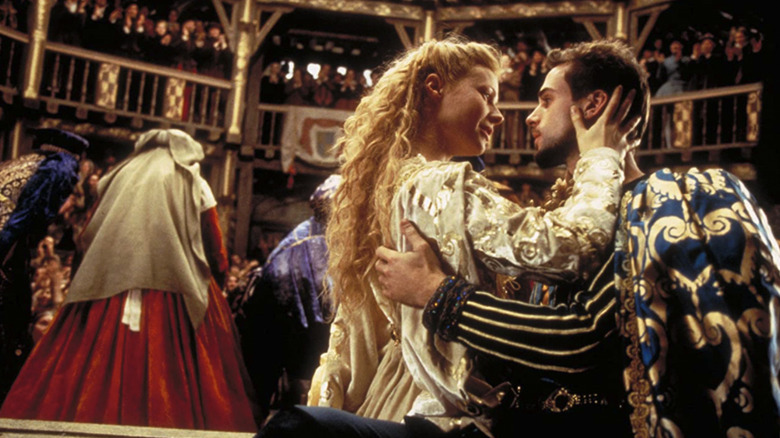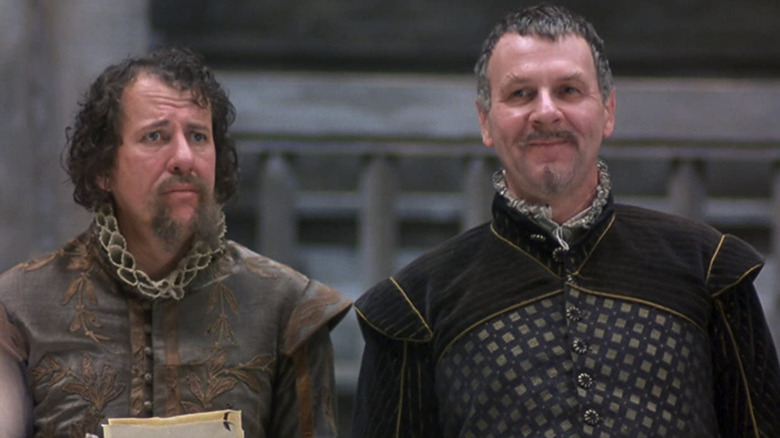The Daily Stream: Shakespeare In Love Wisely Values Romance Over Accuracy
(Welcome to The Daily Stream, an ongoing series in which the /Film team shares what they've been watching, why it's worth checking out, and where you can stream it.)
The Movie: "Shakespeare in Love"
Where You Can Stream It: HBO Max
The Pitch: In 1593 London, a moody, sexy playwright named William Shakespeare (ever heard of him?) needs to write a new play, but he finds himself romantically dejected and creatively up against a wall. But he is inspired by a one-two punch that happens nearly simultaneously: he sees an inspiring audition by a young man named Thomas Kent, and he falls hard for a rich girl named Viola de Lesseps. Little does Shakespeare know — at least at first — that Kent is actually de Lesseps in disguise (she desperately wants to be an actor, but women weren't allowed to perform on stage at that time). As the film goes on, Shakespeare converts his nascent play "Romeo and Ethel, the Pirate's Daughter" into the beloved "Romeo and Juliet."
Why It's Essential Viewing
A reductive (but not inaccurate) read on this movie is that it's almost like a Marvel Cinematic Universe entry for Shakespeare stories: there are Easter eggs galore throughout this film and audiences familiar with The Bard's work can derive pleasure from spotting all of them, basically recreating the "Rick Dalton from 'Once Upon a Time in Hollywood' points at the screen" meme whenever Shakespeare clocks a turn of phrase or an event that he will later repackage for his plays.
But there's a better reason to watch this movie: genuine chemistry between its lead actors. Joseph Fiennes, totally unrecognizable from his work on "The Handmaid's Tale," and Gwyneth Paltrow, who surely remembers being in this movie since she won an Oscar for her performance, are both excellent — and crucially, you actually believe that they're hot for each other. Modern movies seem to have a major problem with this type of thing (see: the laugh-out-loud lack of sexual chemistry between Dwayne Johnson and Emily Blunt in "Jungle Cruise"), but here, when Viola and Will are sneaking clandestine kisses and throwing lusty looks at each other, you completely buy it.
Blissfully, the film is not interested in accuracy in the slightest. It depicts Shakespeare shaping "Romeo and Juliet" basically on the fly, taking initial inspiration from rival Christopher Marlowe and then writing new pages each day which reflect moments from his love affair with Viola. (The film's structure allows some of these moments to intercut between the "real" version with Fiennes and Paltrow and the fictionalized stage version, to great effect.) In reality, "Romeo and Juliet" was not an original story: Shakespeare essentially adapted it from an older Italian story, adding a few extra characters and tweaking the ending. It's far more cinematic (and narratively interesting) to depict a story of star-crossed lovers being inspired and informed by the writer and his muse, and I'm grateful that writers Marc Norman and Tom Stoppard valued crafting a swooning romantic tale over trying to capture the truth. (It should be noted that "the truth," in this particular case, is even more subjective than usual, because some people don't believe that Shakespeare wrote all of his plays. Roland Emmerich made a whole movie about that controversy called "Anonymous," which I recall being intrigued by when it came out in 2012.)
This "story first" approach certainly went over well with Academy voters: Norman and Stoppard won the Best Original Screenplay Oscar that year. The movie itself won Best Picture, Paltrow won Best Actress, and Judi Dench won Best Supporting Actress. Which leads me to the last point I want to make about this movie: its supporting cast rules. Geoffrey Rush plays a bumbling theater owner, Ben Affleck slides in with a great sh*t-eating grin to play a respected stage actor, Colin Firth plays an unrepentant jackass who becomes Viola's husband-to-be, Rupert Everett drops by to play Marlowe in a couple of scenes, and, most delightfully of all, Tom Wilkinson plays a money man who finances "Romeo and Juliet," eventually scores a small role as the apothecary, and spends the rest of the movie being adorably excited about playing the part and concerned that he might screw it up. The movie thinks it's a bit funnier than it actually is, but everything involving Wilkinson works like an absolute charm.

